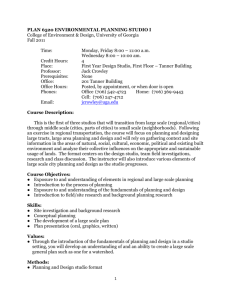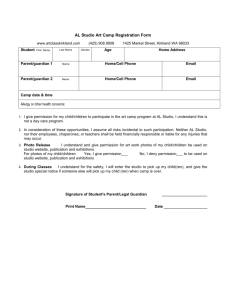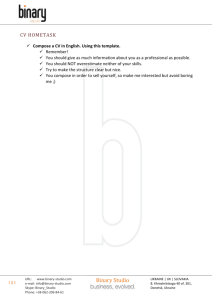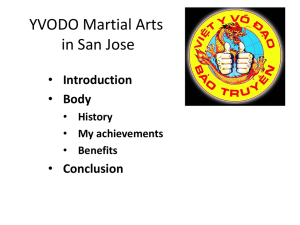MSc Urban Design (Jan 2015) - University of Central Lancashire
advertisement
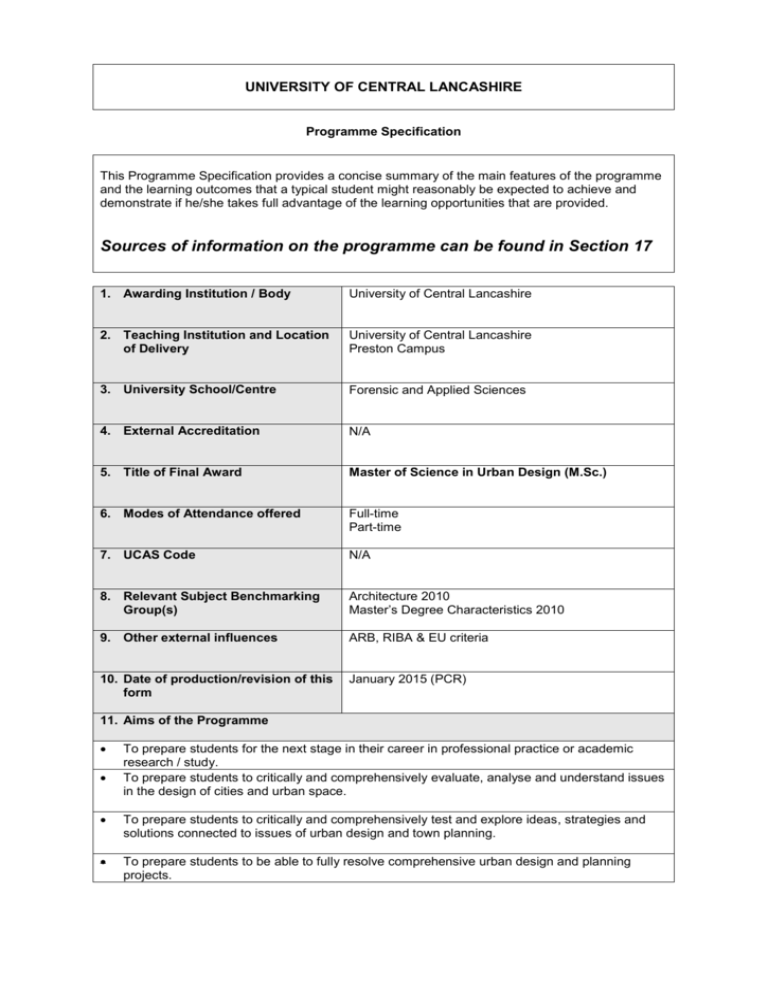
UNIVERSITY OF CENTRAL LANCASHIRE Programme Specification This Programme Specification provides a concise summary of the main features of the programme and the learning outcomes that a typical student might reasonably be expected to achieve and demonstrate if he/she takes full advantage of the learning opportunities that are provided. Sources of information on the programme can be found in Section 17 1. Awarding Institution / Body University of Central Lancashire 2. Teaching Institution and Location of Delivery University of Central Lancashire Preston Campus 3. University School/Centre Forensic and Applied Sciences 4. External Accreditation N/A 5. Title of Final Award Master of Science in Urban Design (M.Sc.) 6. Modes of Attendance offered Full-time Part-time 7. UCAS Code N/A 8. Relevant Subject Benchmarking Group(s) Architecture 2010 Master’s Degree Characteristics 2010 9. Other external influences ARB, RIBA & EU criteria 10. Date of production/revision of this form January 2015 (PCR) 11. Aims of the Programme To prepare students for the next stage in their career in professional practice or academic research / study. To prepare students to critically and comprehensively evaluate, analyse and understand issues in the design of cities and urban space. To prepare students to critically and comprehensively test and explore ideas, strategies and solutions connected to issues of urban design and town planning. To prepare students to be able to fully resolve comprehensive urban design and planning projects. To prepare students with the ability to critically evaluate the theories of urban design and the histories of local, regional and global contexts, in order to develop sustainable urban design solutions. To prepare graduates with the ability to generate comprehensive urban design solutions to achieve a high standard of formal, aesthetical, technical and sustainable resolution. To prepare graduates with the skills to present a professional e range of visual, oral verbal and written media to test, analyse, critically appraise and explain their work. To prepare graduates to evaluate and integrate materials, processes and techniques appropriate for complex urban design solutions. To prepare graduates to understand the advancement of knowledge through rigorous written research and design projects. To equip graduates with the necessary skills to identify areas for personal and professional development. 12. Learning Outcomes, Teaching, Learning and Assessment Methods A. Knowledge and Understanding Students will demonstrate a knowledge and understanding of: A1; the histories and theories of urban design and the related arts, technologies and social sciences and their influence on the development of urban design and planning. A2; the histories and theories of architecture and their relationship with urban design. A3; networks, services, and urban infrastructure. A4; the influence of social, cultural, political, economic and environmental drivers within urban design and planning. A5; the influence of capitalism, socialism, neo-liberalism and post-colonialism on the impact of urban space and the city. A6; the use of demographic and other forms of data for informing urban design and planning processes. A7; the importance of environmental, ecological and sustainable concerns within urban design. A8; statutory regulations, procedures and planning policies and their relation to the development of urbanism and town planning. Teaching and Learning Methods Specific teaching and learning methods will be identified in Module Information Packs (MIPs), and will include lectures, tutorials, seminars, studio, reviews, presentations and site visits. Students will also undertake independent study with the use of textbooks, journal papers, electronic databases and other self-learning materials including e-learning materials. Assessment methods Assessment methods will be clearly defined in Module Information Packs (MIPs) at the outset of the module along with details of the relevant marking scheme and assessment criteria. The programme will include essay assignments, practical reports, design portfolios, verbal presentations and a thesis submission to assess students. Written work and design portfolios will be double marked and moderated by staff appropriate to the subject area, and following which summative feedback will be issued to the student. Studio work will be reviewed at interim and final stages by verbal presentation, following which formative feedback will be issued to the student. Studio projects and parts of studio projects will be continuously reviewed via critical reflection sessions, tutorials and studio dialogue. Emphasis will be placed upon final assessment at the end of all modules and the programme. B. Subject-specific skills Students will be able to critically evaluate, test, analyse, appraise and respond to issues concerning the following subject areas and present them as part of a comprehensive urban design solution. Students will be able to: B1; prepare a comprehensive project brief which will address the complexity of urban space and planning with regard to infrastructure, public and private realms, and local, regional and global communities. B2; understand and explore socio-cultural, socio-political, socio-economic, and socio-spatial phenomena and issues of identity, ownership and occupation in cities. B3; contextualise their own work within the scope of statutory regulations, legislation, policy and procedures. B4; develop appropriate strategic approaches within the constraints of local, regional and global urban conditions. B5; develop appropriate responses to urban and planning issues with respect to people and place. B6; acknowledge and embrace the importance of interdisciplinary and multidisciplinary collaboration within their own project work. B7; contextualise and relate their own urban design projects to the critical and cultural context of architecture and urban design. B8; produce a written research thesis in the History and Theory of Urban Design within an agreed scope and subject area, to a publishable level. Teaching and Learning Methods Specific teaching and learning methods will be identified in Module Information Packs (MIPs), and will include lectures, tutorials, seminars, studio, reviews, presentations and site visits. Students will also undertake independent study with the use of textbooks, journal papers, electronic databases and other self-learning materials including e-learning materials. Assessment methods Assessment methods will be clearly defined in Module Information Packs (MIPs) at the outset of the module along with details of the relevant marking scheme and assessment criteria. The programme will include essay assignments, practical reports, design portfolios, verbal presentations and a thesis submission to assess students. Written work and design portfolios will be double marked and moderated by staff appropriate to the subject area, and following which summative feedback will be issued to the student. Studio work will be reviewed at interim and final stages by verbal presentation, following which formative feedback will be issued to the student. Studio projects and parts of studio projects will be continuously reviewed via critical reflection sessions, tutorials and studio dialogue. Emphasis will be placed upon final assessment of at the end of all modules and the programme. C. Thinking Skills Students will be able to: C1; critically evaluate, test, analyse, appraise and respond to the demands of urban design within particular local, regional and global contexts. C2; assess and appraise urban design and planning ideas and solutions to a high level of resolution. C3; consider, evaluate and critically understand socio-cultural and demographic contexts and their relationships with urban design. C3; fully integrate conceptual, contextual, ethical, technical and material considerations into the realisation of a comprehensive urban design project. C4: evaluate and appraise their own work through self-reflection and peer-review discussion groups. C5; meet deadlines by employing time management, organisation and planning of work and independent study. Teaching and Learning Methods Specific teaching and learning methods will be identified in Module Information Packs (MIPs), and will include lectures, tutorials, seminars, studio, reviews, presentations and site visits. Students will also undertake independent study with the use of textbooks, journal papers, electronic databases and other self-learning materials including e-learning materials. Assessment methods Assessment methods will be clearly defined in Module Information Packs (MIPs) at the outset of the module along with details of the relevant marking scheme and assessment criteria. The programme will include essay assignments, practical reports, design portfolios, verbal presentations and a thesis submission to assess students. Written work and design portfolios will be double marked and moderated by staff appropriate to the subject area, and following which summative feedback will be issued to the student. Studio work will be reviewed at interim and final stages by verbal presentation, following which formative feedback will be issued to the student. Studio projects and parts of studio projects will be continuously reviewed via critical reflection sessions, tutorials and studio dialogue. Emphasis will be placed upon final assessment of at the end of all modules and the programme. D. Other skills relevant to employability and personal development Graduates will develop a series of transferable skills as follows: D1; gain a thorough overview of the development and evolution of cities and urban space under various conditions. D2; an understanding of the nature of commercial development and its impact on local and regional urban development. D3; effective interpersonal communication, with colleagues and a wider audience through a variety of presentation techniques. D4; the ability to take initiative and responsibility in order to make decisions in challenging situations. D5; solve complex logistical problems in creative and innovative ways to meet local and regional demands. D6; learn independently and appropriately, including the ability to pursue further research where necessary. Teaching and Learning Methods Specific teaching and learning methods will be identified in Module Information Packs (MIPs), and will include lectures, tutorials, seminars, studio, reviews, presentations and site visits. Students will also undertake independent study with the use of textbooks, journal papers, electronic databases and other self-learning materials including e-learning materials. Assessment methods Assessment methods will be clearly defined in Module Information Packs (MIPs) at the outset of the module along with details of the relevant marking scheme and assessment criteria. The programme will include essay assignments, practical reports, design portfolios, verbal presentations and a thesis submission to assess students. Written work and design portfolios will be double marked and moderated by staff appropriate to the subject area, and following which summative feedback will be issued to the student. Studio work will be reviewed at interim and final stages by verbal presentation, following which formative feedback will be issued to the student. Studio projects and parts of studio projects will be continuously reviewed via critical reflection sessions, tutorials and studio dialogue. Emphasis will be placed upon final assessment of at the end of all modules and the programme. 13. Programme Structures* 14. Awards and Credits* Level Level 7 Module Code AO4001 Module Title Critical and Cultural Context Credit rating 20 AO4008 Urban Design Studio 1 40 AO4002 Innovation and Realisation 20 AO4009 Urban Design Studio 2. 40 AO4950 Research Methods for Architectural Studies 20 AO4990 Written Thesis 40 Masters of Science in Urban Design Requires a minimum of 180 credits at Level 7 Postgraduate Diploma in Urban Design Requires a minimum of 120 at Level 7 Postgraduate Certificate in Urban Design Requires a minimum of 60 at level 7 15. Personal Development Planning PDP is embedded in the curriculum. We expect postgraduate students to already have IT & Study skills and library & information retrieval skills. During the course, these skills will become further developed, through naturally arising opportunities in the curriculum, for advanced scholarship and research and preparation for course assessment. Section 12 (above) gives more specific detail. On this programme individuals will develop knowledge and understanding (see section 12 A), subject specific skills (see section 12 B) and thinking skills (see section 12 C). On a vocationally orientated course like this these all relate to PDP. Section 12 D specifically outlines the “other skills relevant to employability and personal development”. 16. Admissions criteria Programme Specifications include minimum entry requirements, including academic qualifications, together with appropriate experience and skills required for entry to study. These criteria may be expressed as a range rather than a specific grade. Amendments to entry requirements may have been made after these documents were published and you should consult the University’s website for the most up to date information. Students will be informed of their personal minimum entry criteria in their offer letter. Applicants will have achieved a Bachelor’s Degree with Honours (lower second class or above) in a relevant subject including architecture, town planning, geography, urban design, sociology, etc. Equivalent learning from other study or experience may also serve to meet this requirement and will be assessed through the University’s process for the Accreditation of Prior Leaning (APL) Students applying for the MSc in Urban Design must have a minimum level of proficiency equal to IELTS 6.5* or equivalent in the English language. 17. Key sources of information about the programme www.uclan.ac.uk 18. Curriculum Skills Map Please tick in the relevant boxes where individual Programme Learning Outcomes are being assessed Programme Learning Outcomes Module Level Code Module Title Core (C), Compulsory (COMP) or Option (O) Knowledge and understanding Subject-specific Skills Other skills relevant to employability and personal development Thinking Skills A1 A2 A3 A4 A5 A6 A7 A8 B1 B2 B3 B4 B5 B6 B7 B8 C1 C2 C3 C4 C5 D1 D2 D3 D4 D5 D6 AO4001 Critical and Cultural Context C Innovation and Realisation C X X X LEVEL 7 AO4002 Note: X AO4008 Urban Design Studio 1 C AO4009 Urban Design Studio 2 C AO4950 Research methods for architectural studies. C AO4990 Written Thesis. C X X X X X X X X X X X X X X X X X X X X X X X X X X X X X X X X X X X X X X X X X X X X X X X X X X Mapping to other external frameworks, e.g. professional/statutory bodies, will be included within Student Handbooks X X X


